environmental justice

PEOPLE OF COLOR in the United States are exposed to 38 percent more asthma-producing nitrogen dioxide than are white people. People of color are twice as likely as whites to live without potable water or modern sanitation.
The “big green” environmental movement often focuses on national issues and federal policy, dividing people along partisan lines of red or blue. But churches and low-income communities focus on people and their daily lived experiences. Though both are fighting for just causes, because the environment affects us all, the big greens sometimes overlook the people on the ground or do not represent them accurately.
“We have a moral and spiritual obligation to look at the impact of climate change in general and how it impacts people, including our constituents,” said Rev. Leo Woodberry, pastor of Kingdom Living Temple, an independent African-American church in Florence, S.C.
Woodberry’s church takes a robust approach to local environmental issues, including looking at climate change, air quality, and environmental justice for communities that are over-burdened and vulnerable, particularly communities of color. They also look at “environomics,” said Woodberry. “That’s where the economy and environment meet and allows corporate polluters to come into communities and dump toxins because it’s profitable for them,” he said.
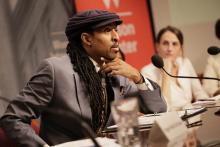
The White House and Pruitt have proposed a budget for the EPA that would cut the agency’s budget by $2 billion and eliminate 20 percent of the workforce, including the entire Office of Environmental Justice. In his letter, Ali suggests the budget cuts will specifically harm those most in need of help, saying that the agency’s new leadership hasn't given "any indication that they are focused or interested in helping those vulnerable communities.”
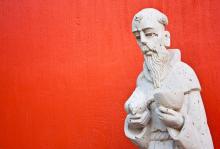
Francis’ life shows us that were he with us today, he would likely be less concerned with the blessings of pets and more concerned with the racism and classism of our environmental problems.
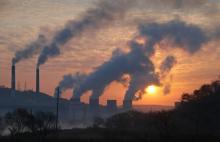
FAITH-BASED COMMUNITIES have been at the forefront of environmental justice work since the phrase first came into use. In 1987, the United Church of Christ’s Commission for Racial Justice published the report Toxic Wastes and Race in the United States. The report—the first of its kind—documented the connection between the siting of hazardous waste sites and the race of the communities where they were located.
For Aaron Mair—an epidemiological-spatial analyst with the New York State Department of Health—environmental justice organizing began in 1984 when he and his family moved to the Arbor Hill neighborhood of Albany, N.Y. The 80-percent-black neighborhood was home to an incinerator that resulted in two of his daughters having upper-respiratory health issues, according to Mair. The neighborhood’s toxic air prompted Mair to begin organizing his community to get the incinerator shut down.
In May 2015, Mair was elected as the first African-American president of the Sierra Club, a national environmental organization with more than 800,000 members. Raven Rakia, a freelance journalist and Grist fellow, interviewed Mair for Sojourners in February.
Raven Rakia: What’s the significance of your becoming the first black president of the Sierra Club?
Aaron Mair: I didn’t start out to make history with the Sierra Club. I started out to make history as an environmental justice activist by elevating the voice of communities of color with regard to equal treatment and protection under the law.

While Michigan Gov. Rick Snyder has admitted that mistakes have been made and takes full responsibility, the residents of Flint to this day have not found remedy. His initial action was to have city fire stations serve as bottled water and water filter distribution points. Michigan National Guard personnel provided water to residents there.
And the nation knows the crisis — high lead levels in children’s blood tests and a spike in Legionnaires disease.
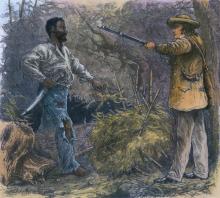
WHEN ONE THINKS of black environmental liberation theology, the name of slave-rebellion leader Nat Turner might not immediately spring to mind. Perhaps it should.
A biopic on the life of Turner, called The Birth of a Nation, is scheduled for release in October. Based on early reviews, I expect the film by director Nate Parker (Red Tails, Arbitrage) to deliver a powerful recounting of Turner’s life.
In 1831, Turner led enslaved and free African Americans in a rebellion against slaveholders in Southampton County, Va. The uprising was swift, violent, and bloody. At least 200 African Americans and more than 50 whites died. After whites quelled the rebellion, Turner hid in the woods for several weeks. He was eventually captured and executed.
Turner’s time alone in the woods offers surprising insights. He is an African-American man familiar with nature. He is a Christian preacher given to visions. From that arises a deep environmental wisdom.
The original report of the slave rebellion is found in The Confessions of Nat Turner, The Leader of the Late Insurrection in Southampton VA, as told by Turner to a white lawyer in Richmond, Va. “The blood of Christ [that] had been shed on this earth, and had ascended to heaven for the salvation of sinners,” Turner says in the book, “was now returning to earth again in the form of dew.”
Turner’s visions were based on his understanding of the Bible. He was literate (that in itself was unusual for one enslaved) and worshipped God. Turner was a prophet of God, in the context of nature and revolt.
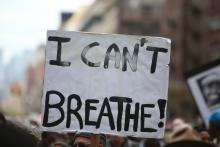
The story of Jesus’ passion and death has stirred my imagination since I was a child. In an act of profound mystery, Jesus walks towards the conflict swirling around him. Jesus accepts his arrest and does not raise his voice. His willingness to embrace the consequences of truth-telling leaves him silent in the face of his accusers. His judges repeatedly say they can find no fault in this man, but the people want more. They want someone to blame.

Last night’s Democratic presidential primary debate in Flint, Mich., ran the gamut on issues, from guns to trade to racism to religion.
But it was also the most environmentally focused debate yet in the 2016 campaign.
Here’s a quick summary of the main environmental issues that came up (and a couple that didn’t).
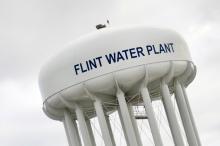
America’s poor always bear the brunt of manmade ecological problems. Urban air pollution, dwelling near industrial facilities and their waste, and exposure to lead paint are a few of the ways that the poor are put at risk; they face more health problems caused by environmental factors than anyone else. Based on this, I ask this question: Should environmental justice be at the forefront of the church’s social justice ministries?
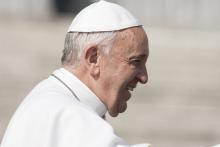
By choosing to focus on the plight of the poor and the groaning of the earth itself, Francis is tapping into something much deeper than denominational squabbles and political maneuvering. He is seeking to make an end-run around the tedious shouting matches of privileged contenders in pitched ideological battles. This is a pope, not of the pundits but of the people – and of the planet.
We’re all connected. Just as the body of Christ is one – despite all of our institutional and ideological boundaries – all of humanity, all life is one. We’re rooted together in the soil that feeds us, in the natural ecosystems that sustain our very existence.

Even as the clock ticks down to COP 21 in Paris this coming December, agreement has yet to be reached about exactly what the conference could or should accomplish. There is little consensus concerning outcomes that might actually bring about change. Not unlike other issues where binary thinking has predominated, we are presented with an either/or scenario: economic collapse and damaging human impact, or economic prosperity and destructive impact on climate.
What is different now, however, is that the economic axis has shifted. Crucial to the Paris discussions is the fact that Western-driven economic theory and practice, rooted in the competitive polarities of prosperity versus paucity, now dominate the globe, while Western economies themselves do not. And it is this largely binary economic way of framing the issues of the environment that militates against significant accomplishment in Paris. Not unlike Copenhagen in 2009, or Kyoto in 1997, governments are posturing so as not to give away economic advantage. National prosperity continues to trump the environment.

The prophets’ preoccupation with justice and righteousness has its roots in a powerful awareness of injustice. That justice is a good thing, a fine goal, even a supreme ideal, is commonly accepted. What is lacking is a sense of the monstrosity of injustice. Moralists of all ages have been eloquent in singing the praises of virtue. The distinction of the prophets was in their remorseless unveiling of injustice and oppression, in their comprehension of social, political, and religious evils. —Abraham Joshua Heschel, The Prophets
Injustice anywhere is a threat to justice everywhere. We are caught in an inescapable network of mutuality, tied in a single garment of destiny. Whatever affects one directly, affects all indirectly. —Martin Luther King, Jr.
According to the U.S. Environmental Protection Agency, environmental justice is defined as:
The fair treatment and meaningful involvement of all people regardless of race, color, national origin, or income with respect to the development, implementation, and enforcement of environmental laws, regulations, and policies.
As we consider this definition, and look around our communities, do we find this fair treatment taking place? Are we aware of how economic and environmental decisions are made? Many times it can become so overwhelming that we think it best to leave it to the experts. Unfortunately, this can lead to exploitation, as discrimination typically takes place in poor and underserved communities where people may not understand their rights, or they choose not to fight back out of fear. As we dig deeper and the shackles are removed, we begin to see how economic and environmental justice are connected and how this exploitation is directly related to incentives like government funding, tax breaks, and land grabs that favor corporations over human beings and the environment. Does the end result benefit all God’s creation or just a wealthy few?
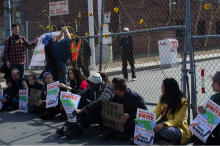
“An individual who breaks a law that conscience tells him is unjust, and who willingly accepts the penalty of imprisonment in order to arouse the conscience of the community over its injustice, is in reality expressing the highest respect for the law” —Martin Luther King, Jr.
Last year on a crisp afternoon in March, I was one of nine people arrested by the NYPD and taken away to the local precinct for processing. My crime? Attempting to plant detoxifying sunflowers on public brownfield land on the South Bronx waterfront in New York City.
Earlier in the day, more than 100 residents, faith leaders, organizations, friends, and allies came together to protest the proposed relocation of the online grocer FreshDirect to a residential neighborhood in the South Bronx. After a jubilant and joyous interfaith reflection and prayer vigil outside the entrance to the waterfront location, security guards refused to let us cross the gate, so we sat in front of it in protest — a peaceful and non violent act of civil disobedience.
Our coalition, South Bronx Unite, works to improve and protect the social, environmental, and economic future of the South Bronx in New York City, located in the poorest congressional district in the country. For three years we have been fighting to stop FreshDirect from receiving more than $100 million in subsidies and incentives to build a diesel trucking distribution center on public land along the Bronx Kill Waterfront.

This past Sunday, I had the opportunity to watch our children’s ministry present through play, song, and dance the story of the birth of Jesus Christ.
No matter how many times I have seen this story, it’s always amazing that this miracle that happened in a manger could have such a huge impact on the lives of so many. Jesus was not born with a silver spoon in his mouth, his parents did not have the best reputation, and he definitely wasn’t birthed in a fancy hospital. Instead, he was born where animals were kept — not the best conditions environmentally at all! Further, Jesus Christ became an advocate for the poor, for those that do not always have a voice, and for those that were suffering from terrible mistreatment, disease, and sickness.
I truly believe that Jesus’s focus on the “least of these” is a model for advocacy, especially for the environmental justice movement.

Columbia, Mississippi is a small rural town most known as the home of Walter Payton, NFL player for the Chicago Bears. It is also my home — the place where I was born and raised.
On January 1, 1992, Jesus People Against Pollution was founded in Columbia. Residents had discovered that the town had been heavily polluted from the Newsom Brothers/Old Reichhold Chemical Company facility, now closed but still registering high levels of hazardous waste — what the EPA calls a “Superfund site.”
In March 1977, the plant exploded and wrecked the facility and surrounding community. The Old Reichhold Chemical Company abandoned their facility and hired an inexperienced contractor to dispose of the remaining toxins left on the site.

GDP Revised Up To 3 Percent In Fourth-Quarter; Why Foreign Assistance Is Still Important; Syrian Army Assaults Rebel Districts; Public Views Of The Divide Between Religion And Politics; What Did Congress Do To Combat Poverty In 2011? Virtually Nothing (OPINION); Environmental Justice A Form Of Social Justice (OPINION); Occupy LSX May Be Gone, But The Movement Won't Be Forgotten; World’s Extreme Poverty Cut In Half Since 1990; Poverty Resolutions, Microloan Nonprofit, Shows How Far $1 Can Go To Provide Jobs For Poor; Alabama Lawmakers Calls For Immigration Law Repeal.
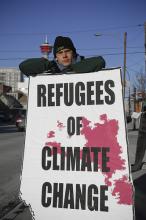
Climate change affects the poorest the hardest. Most things do. In the parts of the world where climate change is most prevalent, it is those who have done the least to cause it that are bearing the brunt of its effects.
It is the Malawian farmer whose crops have failed because the seasonal rains didn’t start at the usual time. It’s a Bangladeshi who can see the sea-levels rising around her town year after year, and has nowhere to go. It’s even an American family whose food bill grows ever larger because of the stresses that a changing climate is having on food security worldwide.
These are neither the people nor the organizations that have spent decades turning a blind eye to their responsibility as good stewards of our environment. They are not the people who, in the face of more and more extreme weather patterns, turn an issue of human survival into an ideological war.
It is for them that we must adapt.
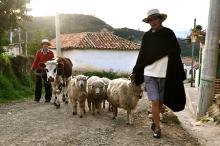
Colombia's campesinos ("people of the land") — peasants, farmers and artisanal miners, the indigenous — are calling out for an end to the exploitation and environmental destruction of their lifelong territories and homes.
They call out for a restoration of their livelihoods. Greed and violence punishing their land is also visited upon the campesinos themselves, leaving them dead, disappeared or disenfranchised as one of the world's largest internally displaced people groups.
The campesinos of Colombia have come together and called out.
Will we listen?
Will we locate our own story in theirs?
Will justice be done? Are we willing to work for it?
Hundreds of miners, activists, students, academics, environmentalists, and other citizens are marching to West Virginia's historic Blair Mountain in an effort to save it from mountaintop removal.